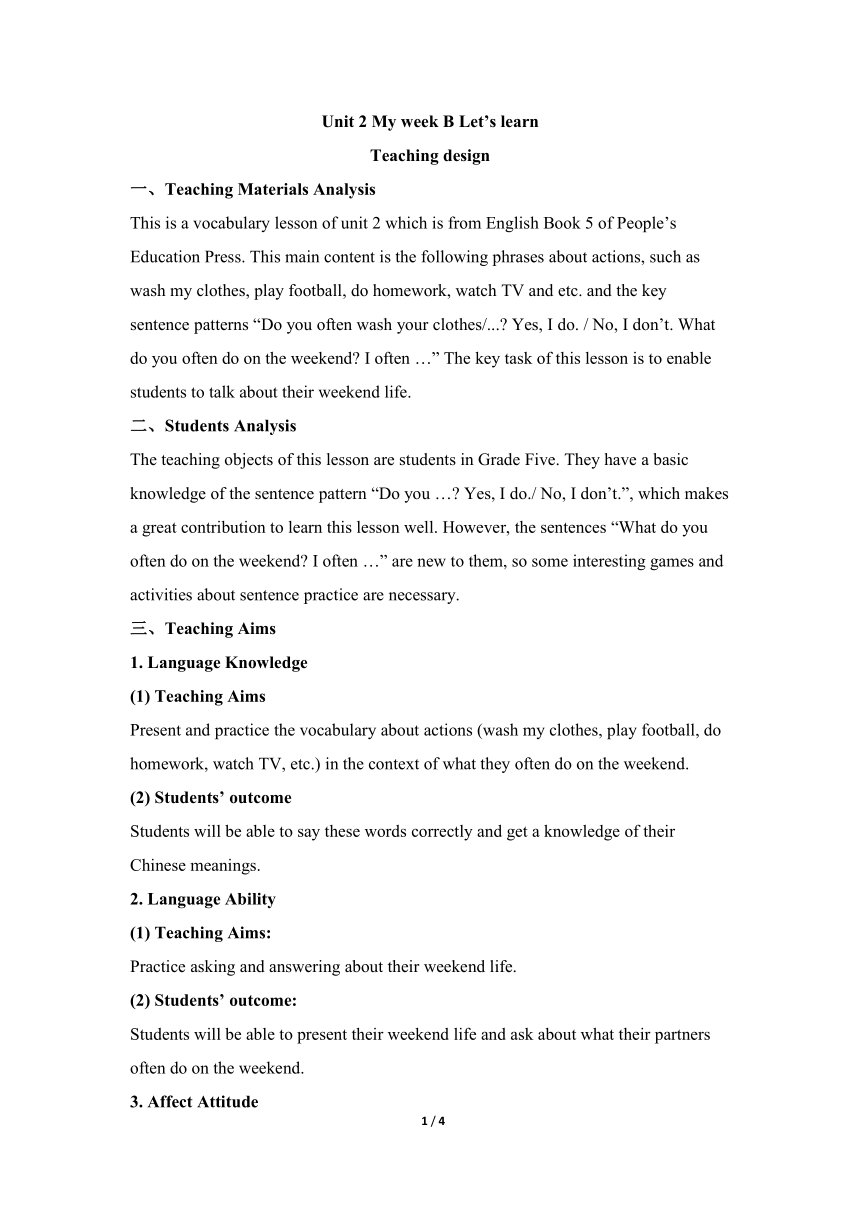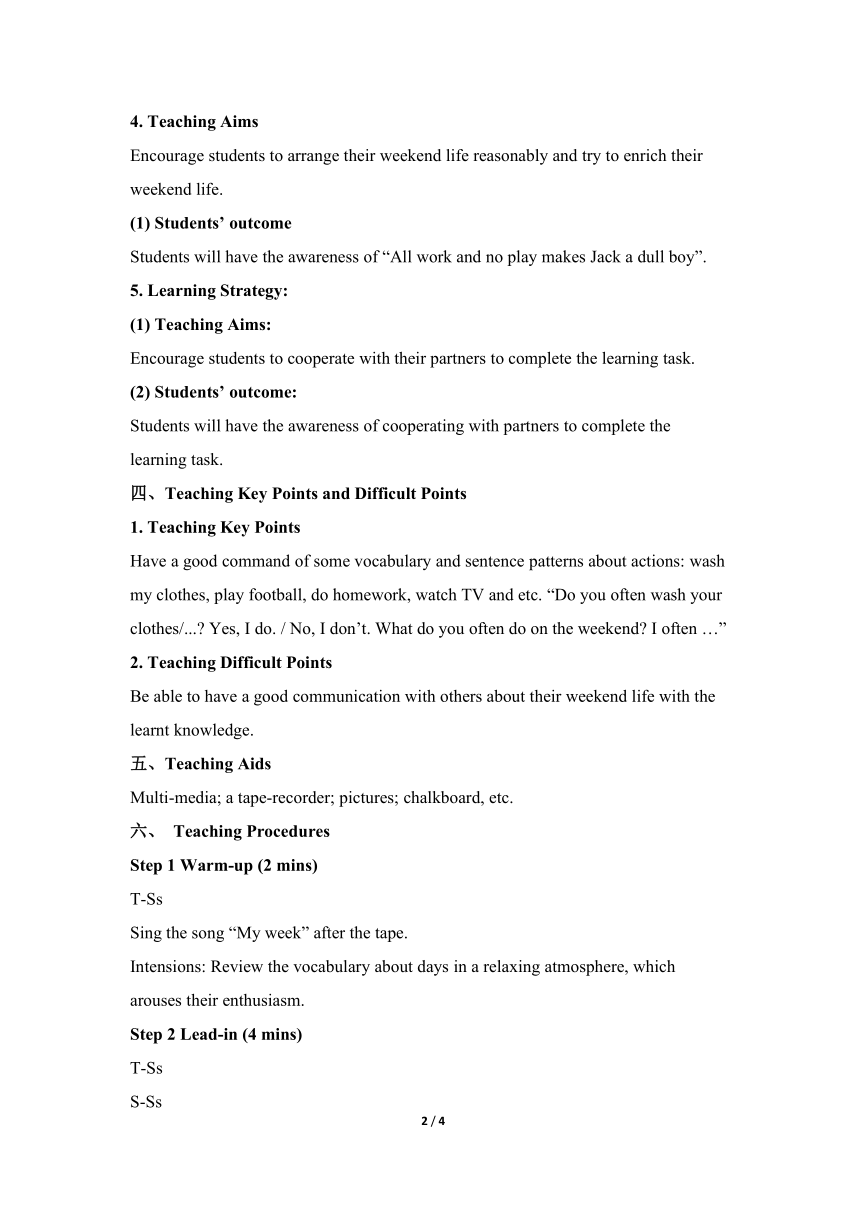Unit 2 My week B Let’s learn 全英教案
文档属性
| 名称 | Unit 2 My week B Let’s learn 全英教案 |

|
|
| 格式 | zip | ||
| 文件大小 | 15.2KB | ||
| 资源类型 | 教案 | ||
| 版本资源 | 人教版(PEP) | ||
| 科目 | 英语 | ||
| 更新时间 | 2019-09-29 00:00:00 | ||
图片预览


文档简介
Unit 2 My week B Let’s learn
Teaching design
一、Teaching Materials Analysis
This is a vocabulary lesson of unit 2 which is from English Book 5 of People’s Education Press. This main content is the following phrases about actions, such as wash my clothes, play football, do homework, watch TV and etc. and the key sentence patterns “Do you often wash your clothes/...? Yes, I do. / No, I don’t. What do you often do on the weekend? I often …” The key task of this lesson is to enable students to talk about their weekend life.
二、Students Analysis
The teaching objects of this lesson are students in Grade Five. They have a basic knowledge of the sentence pattern “Do you …? Yes, I do./ No, I don’t.”, which makes a great contribution to learn this lesson well. However, the sentences “What do you often do on the weekend? I often …” are new to them, so some interesting games and activities about sentence practice are necessary.
三、Teaching Aims
1. Language Knowledge
(1) Teaching Aims
Present and practice the vocabulary about actions (wash my clothes, play football, do homework, watch TV, etc.) in the context of what they often do on the weekend.
(2) Students’ outcome
Students will be able to say these words correctly and get a knowledge of their Chinese meanings.
2. Language Ability
(1) Teaching Aims:
Practice asking and answering about their weekend life.
(2) Students’ outcome:
Students will be able to present their weekend life and ask about what their partners often do on the weekend.
3. Affect Attitude
4. Teaching Aims
Encourage students to arrange their weekend life reasonably and try to enrich their weekend life.
(1) Students’ outcome
Students will have the awareness of “All work and no play makes Jack a dull boy”.
5. Learning Strategy:
(1) Teaching Aims:
Encourage students to cooperate with their partners to complete the learning task.
(2) Students’ outcome:
Students will have the awareness of cooperating with partners to complete the learning task.
四、Teaching Key Points and Difficult Points
1. Teaching Key Points
Have a good command of some vocabulary and sentence patterns about actions: wash my clothes, play football, do homework, watch TV and etc. “Do you often wash your clothes/...? Yes, I do. / No, I don’t. What do you often do on the weekend? I often …”
2. Teaching Difficult Points
Be able to have a good communication with others about their weekend life with the learnt knowledge.
五、Teaching Aids
Multi-media; a tape-recorder; pictures; chalkboard, etc.
六、 Teaching Procedures
Step 1 Warm-up (2 mins)
T-Ss
Sing the song “My week” after the tape.
Intensions: Review the vocabulary about days in a relaxing atmosphere, which arouses their enthusiasm.
Step 2 Lead-in (4 mins)
T-Ss
S-Ss
Answer the questions:
Q1: How many days are there in a week?
Q2: What are they?
Q3: Which day do you like best? Why?
Intensions: Guide students to express their own ideas through questions of different levels.
Step 3 Presentation (16 mins)
T-Ss
S-Ss
S-S
1. Present the vocabulary with my video about my weekend life
A: Watch the video and answer the questions.
B: Read the vocabulary after the tape. Game Time
A: Let’s dance (Look at the phrases and do the actions)
B: Look and say (Look at the actions/pictures and say the phrases)
Intensions: Watching my video and guessing will arouse students’ curiosity. The challenge time can stimulate students’ interest in practicing the pronunciation of these words. Guide to watch TV in a correct way and cultivate them the awareness of helping at home.
Step 4 Production (15 mins)
T-Ss
S-Ss
1. Pair work: Talk about their weekend.
A: What do you often do on the weekend?
B: I often …
2. Group work: Work in groups of four and design a colourful weekend. Then choose a reporter to report.
Intensions: Group work will help students learn to cooperate with others to complete the learning task and motivate their enthusiasm in the participation in consolidating the new words and sentence patterns. The mind-map will help students to arrange their weekend reasonably.
Step 5 Summary (2 mins)
T-Ss
Make a summary of the new words and the sentence pattern by raising questions.
Step 6 Homework (1 min)
T-Ss
Read after the tape.
Design your dream weekend and write them down.
Teaching design
一、Teaching Materials Analysis
This is a vocabulary lesson of unit 2 which is from English Book 5 of People’s Education Press. This main content is the following phrases about actions, such as wash my clothes, play football, do homework, watch TV and etc. and the key sentence patterns “Do you often wash your clothes/...? Yes, I do. / No, I don’t. What do you often do on the weekend? I often …” The key task of this lesson is to enable students to talk about their weekend life.
二、Students Analysis
The teaching objects of this lesson are students in Grade Five. They have a basic knowledge of the sentence pattern “Do you …? Yes, I do./ No, I don’t.”, which makes a great contribution to learn this lesson well. However, the sentences “What do you often do on the weekend? I often …” are new to them, so some interesting games and activities about sentence practice are necessary.
三、Teaching Aims
1. Language Knowledge
(1) Teaching Aims
Present and practice the vocabulary about actions (wash my clothes, play football, do homework, watch TV, etc.) in the context of what they often do on the weekend.
(2) Students’ outcome
Students will be able to say these words correctly and get a knowledge of their Chinese meanings.
2. Language Ability
(1) Teaching Aims:
Practice asking and answering about their weekend life.
(2) Students’ outcome:
Students will be able to present their weekend life and ask about what their partners often do on the weekend.
3. Affect Attitude
4. Teaching Aims
Encourage students to arrange their weekend life reasonably and try to enrich their weekend life.
(1) Students’ outcome
Students will have the awareness of “All work and no play makes Jack a dull boy”.
5. Learning Strategy:
(1) Teaching Aims:
Encourage students to cooperate with their partners to complete the learning task.
(2) Students’ outcome:
Students will have the awareness of cooperating with partners to complete the learning task.
四、Teaching Key Points and Difficult Points
1. Teaching Key Points
Have a good command of some vocabulary and sentence patterns about actions: wash my clothes, play football, do homework, watch TV and etc. “Do you often wash your clothes/...? Yes, I do. / No, I don’t. What do you often do on the weekend? I often …”
2. Teaching Difficult Points
Be able to have a good communication with others about their weekend life with the learnt knowledge.
五、Teaching Aids
Multi-media; a tape-recorder; pictures; chalkboard, etc.
六、 Teaching Procedures
Step 1 Warm-up (2 mins)
T-Ss
Sing the song “My week” after the tape.
Intensions: Review the vocabulary about days in a relaxing atmosphere, which arouses their enthusiasm.
Step 2 Lead-in (4 mins)
T-Ss
S-Ss
Answer the questions:
Q1: How many days are there in a week?
Q2: What are they?
Q3: Which day do you like best? Why?
Intensions: Guide students to express their own ideas through questions of different levels.
Step 3 Presentation (16 mins)
T-Ss
S-Ss
S-S
1. Present the vocabulary with my video about my weekend life
A: Watch the video and answer the questions.
B: Read the vocabulary after the tape. Game Time
A: Let’s dance (Look at the phrases and do the actions)
B: Look and say (Look at the actions/pictures and say the phrases)
Intensions: Watching my video and guessing will arouse students’ curiosity. The challenge time can stimulate students’ interest in practicing the pronunciation of these words. Guide to watch TV in a correct way and cultivate them the awareness of helping at home.
Step 4 Production (15 mins)
T-Ss
S-Ss
1. Pair work: Talk about their weekend.
A: What do you often do on the weekend?
B: I often …
2. Group work: Work in groups of four and design a colourful weekend. Then choose a reporter to report.
Intensions: Group work will help students learn to cooperate with others to complete the learning task and motivate their enthusiasm in the participation in consolidating the new words and sentence patterns. The mind-map will help students to arrange their weekend reasonably.
Step 5 Summary (2 mins)
T-Ss
Make a summary of the new words and the sentence pattern by raising questions.
Step 6 Homework (1 min)
T-Ss
Read after the tape.
Design your dream weekend and write them down.
